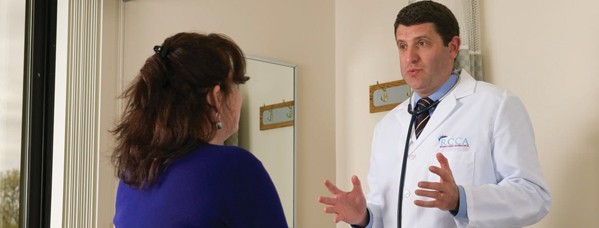Bladder Cancer
The bladder is a hollow, balloon-shaped organ in the lower part of the abdomen that stores urine. Bladder cancer occurs when cells in this organ start to grow in an uncontrolled manner.
HIPAA Alert: Potential Data Breach Learn More
Questions on Oncology, Hematology and/or Infusion Clinical Services due to COVID-19 Crisis – CALL 833-698-1623
Important Information for Our Patients Regarding the Coronavirus.
RCCA Providing Area Cancer Patients with Access to Care During Coronavirus Outbreak
RCCA Offering Patients Virtual Visits During Coronavirus Pandemic
Cancer occurs when cells grow uncontrollably. This uncontrolled growth crowds normal cells, making it difficult for the body to function as it should. Over time, the division of abnormal cells can form large masses called tumors. About two million new cancer cases are diagnosed each year in the United States.
With more than 20 locations in New Jersey, Connecticut, Maryland, and the Washington, D.C., area, Regional Cancer Care Associates (RCCA) specializes in treating patients with a wide range of cancers. Learn more about the many types of cancer and why early detection is the most effective line of defense.
What is cancer? Simply put, it is the uncontrolled growth of abnormal cells in your body. These abnormal cells crowd your normal cells, making it difficult for your body to function as it should. Eventually, those abnormal cells can form into big masses, called tumors.
We’re here for you. Call us at 844-346-7222 or

Tumors are abnormal growths in the body. They can be either benign – meaning that they are not cancerous – or malignant, meaning that they are cancerous. While both types of tumors can cause harm by interfering with healthy tissues and bodily processes, malignant tumors are more dangerous. The danger they present arises in large part from their ability to metastasize, meaning to spread from their point of origin to nearby or even distant parts of the body, eventually causing life-threatening damage. Receiving regular medical checkups is crucial for the early detection and treatment of pre-cancerous conditions or actual cancers.
Unlike malignant tumors, benign tumors will not invade neighboring tissues, but they also can grow and cause health problems. Eventually, a benign tumor may press against vital structures in your body, such as nerves and blood vessels. In these cases, benign tumors will require treatment.
The optimal cancer treatment depends on the type of cancer a patient has, its location and stage, and the person’s overall health. The goal is to effectively treat the disease at its source or at least as early as possible, preventing it from spreading to other areas of the body. The highly experienced medical oncologists of Regional Cancer Care Associates offer personalized care plans for patients, recommending the most effective therapies to treat their conditions. Cancers treated by RCCA specialists include:
Our staff is expert in treating a wide range of cancer types, including:

The bladder is a hollow, balloon-shaped organ in the lower part of the abdomen that stores urine. Bladder cancer occurs when cells in this organ start to grow in an uncontrolled manner.
Brain cancers involve abnormal growth of cells in or around the brain. Which parts of the brain are affected helps determine the type of brain cancer.
One of the most common cancers affecting women, breast cancer starts in one or both breasts when cells begin to grow out of control.
The cervix is the narrow, tubular structure that connects the uterus and vagina. Often caused by human papillomavirus (HPV) infections, cervical cancer occurs most often in people over age 30.
Colon cancer occurs in the large intestine, a part of the body that helps digest food. This type of cancer affects nearly 100,000 newly diagnosed people in America each year.
The esophagus is a long, hollow tube that runs from the throat to the stomach. Esophageal cancer begins in the cells that line the inside of the esophagus.
Fallopian tube cancer affects the two, parallel structures of a woman’s body that carry egg cells from the ovaries to the uterus.
Developing in the throat, mouth, lips, sinuses, or nose, head and neck cancers are most commonly caused by tobacco, alcohol, or infection with HPV.
Kidney cancer occurs when healthy cells in one or both kidneys grow out of control, forming a tumor.
Occurring in the organ that helps digest food and get rid of toxins, liver cancer can be caused by certain diseases, infections, or alcohol.
Lung cancer causes the most cancer-related deaths in the U.S. Smoking is a major risk factor for developing lung cancer.
Mesothelioma develops in the thin tissue that lines the lungs, heart, chest, and abdomen. Most cases are caused by asbestos exposure.
Multiple myeloma is a rare form of cancer that develops in the bone marrow, producing abnormal cells that accumulate and eventually crowd out healthy blood cells.
When the DNA of neuroendocrine cells is damaged, the cells become abnormal, divide out of control, and form tumors known as neuroendocrine tumors (NETs).
Ovarian cancer occurs when genetically mutated cells grow uncontrollably. It includes tumors that grow in the ovaries, fallopian tubes, or peritoneum, which lines the abdomen.
The pancreas aids in digestion and helps control blood sugar levels. Pancreatic cancer attacks this organ and usually affects older adults.
One of the most common types of cancer found in men is prostate cancer. It occurs when malignant cells begin growing rapidly in this gland.
Affecting the lower part of the large intestine, rectal cancer often is grouped with colon cancer and referred to as colorectal cancer.
The body can be attacked by several different types of skin cancers, including melanoma Skin cancer is caused by the irregular development and growth of skin cells, often as a result of excessive sun exposure.
One of the most aggressive forms of lung cancer, small cell carcinoma represents 13% of all lung cancers.
Stomach cancer starts in the lining of the stomach and can spread to nearby organs. Risk factors for stomach cancer include smoking, infections, and a poor diet.
While rare, testicular cancer is the most common form of cancer detected in men between the ages of 15 and 45 years.
The thyroid gland sits at the base of the neck and is responsible for producing several hormones. Because the thyroid contains various kinds of cells, thyroid cancer can take many different forms.
Transitional cell carcinoma affects the transitional cells of the urinary system and accounts for an overwhelming majority of bladder cancer diagnoses.
Also called endometrial cancer, uterine cancer is the most common gynecological cancer. The risk of developing uterine cancer increases with age.
Cancer can affect individuals no matter their, age, race, or gender. It is caused by changes to the DNA within cells and can occur almost anywhere in the body. Being aware of the different types of cancer can help patients remain proactive with screenings and early detection.
Patients in New Jersey, Connecticut, Maryland, and the Washington, D.C., area, can receive excellent care for cancer or blood disorders at more than 20 Regional Cancer Care Associates locations. RCCA’s board-certified oncologists specialize in treating the full range of solid tumors and cancers of the blood and lymphatic system. For more information regarding cancer care plans and treatment options, contact Regional Cancer Care Associates today.
RCCA offers cutting-edge treatment options for every type of cancer. Our expert care teams can match you with the treatment plan that fits your needs. LEARN MORE
Improve your quality of life and learn to manage life with cancer through our integrative services. We offer several solutions to support and promote physical, mental, emotional, and spiritual health. LEARN MORE
The field of cancer treatment is constantly improving and evolving. RCCA conducts hundreds of clinical trials that can help develop new therapies and treatment plans. LEARN MORE
For more information, or to schedule an appointment, call (844) 346-7222. You can also schedule an appointment by calling the RCCA location nearest you.

Regional Cancer Care Associates is one of fewer than 200 medical practices in the country selected to participate in the Oncology Care Model (OCM); a recent Medicare initiative aimed at improving care coordination and access to and quality of care for Medicare beneficiaries undergoing chemotherapy treatment.